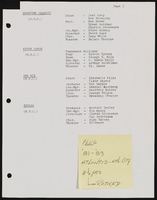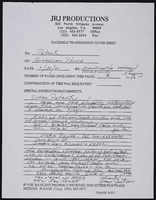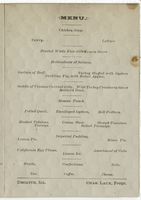Search the Special Collections and Archives Portal
Search Results
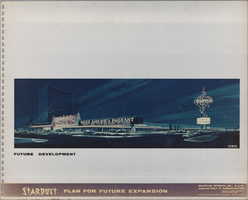
Proposal for the Stardust future expansion (Las Vegas), circa 1964
Date
Archival Collection
Description
Bound proposal for a Stardust expansion including site plan, elevation drawings, and drawings of main architectural elements. This project was not built.
Site Name: Stardust Resort and Casino
Address: 3000 Las Vegas Boulevard South
Image
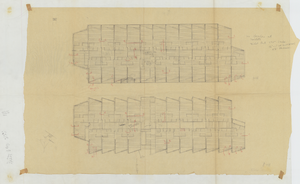
Architectural drawing of the Hacienda (Las Vegas), plumbing details, before 1956
Date
Archival Collection
Description
Details of toilet placement in the guest room area of the Lady Luck, later the Hacienda. The object consists of a sheet of tracing paper taped over a parchment sheet; both have room plans and handwritten notes.
Site Name: Hacienda
Address: 3590 Las Vegas Boulevard South
Image
Gold, Aaron S., Rabbi, 1920-2001
Aaron S. Gold (May 13, 1920-June 13, 2001) was a rabbi who served many congregations including ones in Las Vegas, Wisconsin, and San Diego.
Gold was born in Poland, the son of a rabbi, and the tenth of eleven children. While living in Poland, Gold faced anti-Semitic sentiments and
was once beaten so bad he went into a coma. When he was a child his father and brother emigrated to the United States and sent for the rest of
the family in 1928. After his move to the United States, Rabbi Gold trained as a rabbi and cantor as well as being a certified shochet and moehl.
Person
Hayes, Grace, 1895-1989
Grace Hayes was born on August 23, 1896 in Springfield, Missouri. She moved to San Francisco, California at the age of ten, and began to sing at nightclubs at the age of fourteen. In 1912 Hayes married Joseph Lind, and their son Joseph Conrad Lind (better known as Peter Lind Hayes) was born in 1915. She married twice after Lind; first to Charlie Foy, then to Robert Evan Hopkins. Hayes is best known for her career in motion pictures from 1929 to 1950, primarily for King of Jazz (1930) and Zis Boom Bah (1941).
Person
Armstrong, Sammie R., 1942-
Sammie Ross Armstrong was the owner of Ray and Ross Transport, the largest minority owned company in the state of Nevada during the 1980s and 1990s. In addition to being the second largest bus company in Clark County, Ray and Ross Transport, employed over 180 people and paid higher wages to their drivers than any other West Coast company. The company was voted one of the Top 5 most well run and safest bus companies of that era and owned more than 40 buses.
Person
Antonio, Marie Antoinette, 1970-
"Interviewed by Cecilia Winchell and Stefani Evans. Marie Antonio was born in 1970 in Cagayan de Oro which translates to Golden Friendship. Her father was a doctor who worked as a government employee while her mother was a piano teacher who inspired her love for music and piano at the young age of four. Her grandparents lived on a small island where they would visit for holidays and celebrations, and in her free time she spent her days embracing the beautiful nature of the Philippines and playing outside.
Person

